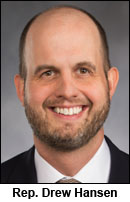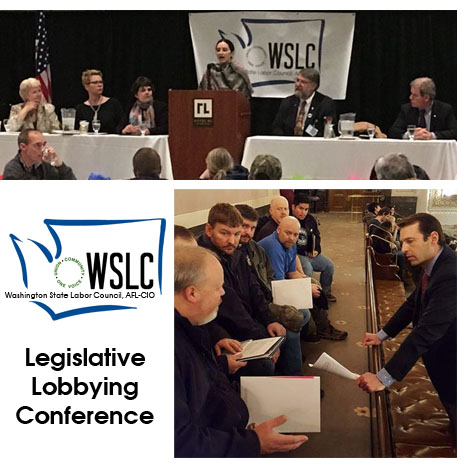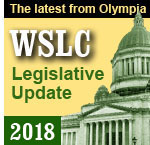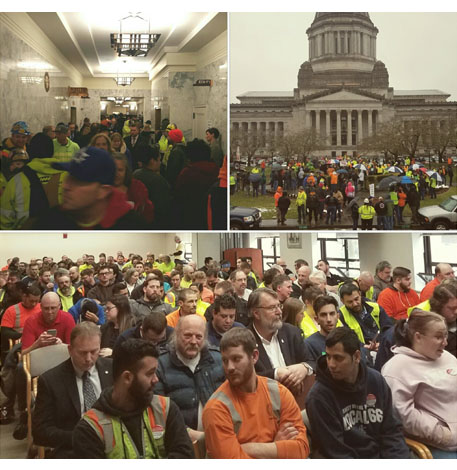STATE GOVERNMENT
What a difference a year (and election) makes
Quick movement in Olympia on capital budget, equal pay, Hanford safety net
OLYMPIA (Jan. 12, 2018) — Over the past year, Senate Republicans have held hostage more than $4 billion worth of job-creating public infrastructure projects over an unrelated water-rights issue. This unprecedented injection of partisan politics into last year’s capital budget approval means that badly needed school construction, sewer improvements and other projects in communities across the state have been suspended — and their costs have increased.
With Democrats gaining control of the Senate, their party leaders in both houses have vowed to move quickly to end this hostage crisis and pass the capital budget. This is one of the highest priorities of the Washington State Labor Council, AFL-CIO in its Shared Prosperity Agenda for 2018.
In the 2018 session’s opening days, the House Capital Budget Committee voted 19-0 to advance the capital budget bill (HB 1075) and the accompanying bond bill (HB 1080), 14-5. The strong bipartisan votes in the House should come as no surprise, given that the House passed the capital budget 92-1 last year before the Senate took this budget hostage.
 But House floor votes on these critical bills, originally scheduled for Thursday, have been postponed.
But House floor votes on these critical bills, originally scheduled for Thursday, have been postponed.
“After talking with Republican leaders, we have decided as a sign of good faith to postpone action on these bills,” said House Majority Leader Pat Sullivan (D-Covington) said in a statement released Thursday. “However, we won’t postpone action for long. Too much is at stake: $4.3 billion in project investments, 19,000 jobs, and federal funding for low-income housing rely on passing the capital budget.”
At press time, there is rumor of an agreement on the water-rights issue addressing a 2016 decision by the state Supreme Court in Hirst v. Whatcom County. That may be what the House’s delay in voting is about. If so, that’s good news. If not, lawmakers can continue to work on the Hirst issue separately.
Either way, they must end this unnecessary, wasteful and cynical hostage crisis once and for all and quickly advance the job-creating capital budget bills.
Senate labor panel wastes no time
In last week’s Legislative Update, we reported that pro-workers bills would be heard in the Senate now that there is a one-vote Democratic majority. Sure enough, the Senate Labor and Commerce Committee — a panel that last year was holding hearings on right-to-work (for less) — held public hearings Wednesday on bills to promote equal pay, protect Hanford workers and their families, and to enact the Washington Fair Chance Act that gives people with criminal records an opportunity to find work.
What a difference a year — and one special election — makes!
Here’s what the Senate labor panel heard Wednesday:
► SB 5140 (Cleveland) — Concerning enforcement of the equal pay act and worker communications about wages and employment opportunities. This aims to address gender-based income disparities and discourage employer discrimination and retaliation, reaffirming Washington’s longstanding pursuit of equality in the workplace. It would prohibit pay secrecy policies that can be used to hide discriminatory practices, promote equitable access to career advancement opportunities, allow the discussion of wages, and prohibit retaliation for asking for equal pay. And importantly, SB 5140 does NOT include a “preemption” clause — as sought by corporate lobbyists — that would block cities from adopting their own innovative policies that also seek to promote equal pay.
► SB 5555 (Wellman) — An act relating to wage and salary information. One way that women find themselves on a career track where they are consistently paid less than men in similar jobs is the dreaded salary history question. Employers’ salary history questions can inadvertently cause these inequalities to snowball over time. For this reason, in an effort to promote fair and equal pay, several cities and states — including California, Oregon, Massachusetts and Delaware — have banned employers from inquiring about salary history during the interview process. SB 5555 would do so in Washington state as well.
“The data are clear. Pay disparities between women and men are systemic and persistent,” said Lynne Dodson, Secretary Treasurer of the Washington State Labor Council, AFL-CIO, was one of several women who testified in support of both of these bills on Wednesday. “These bills are long overdue, should be passed and moved swiftly into law.”
Here is Dodson’s complete testimony:
► SB 5940 (Keiser) — Creating the presumption of occupational disease for certain employees at Hanford. Organized labor and other advocates for Hanford workers strongly support adopting the presumption in our workers’ compensation law that certain cancers and other illnesses among Hanford workers are due to their routine exposure to dangerous chemicals and radioactive materials. Last year, the House version of this legislation sponsored by Rep. Larry Haler (R-Richland) easily passed on a bipartisan 69-29 vote, but was killed without a vote by Senate Republicans.
 “Since last session, we have experienced three emergencies on the Hanford site,” said Nick Bumpaous of UA Plumbers and Steamfitters Local 598. “Two of the most notable were the uncontrolled airborne release of, among a lot of other deadly elements and chemicals, plutonium americium. Now we have at least 30 workers who have tested positive for internal plutonium contamination… It highlights the need for this legislation.”
“Since last session, we have experienced three emergencies on the Hanford site,” said Nick Bumpaous of UA Plumbers and Steamfitters Local 598. “Two of the most notable were the uncontrolled airborne release of, among a lot of other deadly elements and chemicals, plutonium americium. Now we have at least 30 workers who have tested positive for internal plutonium contamination… It highlights the need for this legislation.”
Heroic Hanford employees should not be excluded from the workers’ compensation safety net when they get sick just because it’s difficult or impossible to trace their illness to a specific exposure. Like firefighters, we should assume their illness is work-related. It’s the very least we can do for them and their families.
► SB 6110 (Saldaña) — Prohibiting employers from asking about arrests or convictions before an applicant is determined otherwise qualified for a position. The “Washington Fair Chance Act,” which has bipartisan sponsorship, addresses a fundamental principle: once formerly incarcerated persons have fulfilled their debt to society, they should be able to secure work. By “banning the box” on employment applications that ask about criminal histories, and waiting until after an interview to inquire about this, these folks will have a fair chance to make their case to potential employers.
 “Since last year, the city of Spokane and the county of Spokane have both passed legislation that ‘bans the box’ and gives people who have done their time a chance to reintegrate as quickly as possible into our economy,” said SB 6110’s prime sponsor Sen. Rebecca Saldaña (D-Seattle) as she urged the panel to advance the bill.
“Since last year, the city of Spokane and the county of Spokane have both passed legislation that ‘bans the box’ and gives people who have done their time a chance to reintegrate as quickly as possible into our economy,” said SB 6110’s prime sponsor Sen. Rebecca Saldaña (D-Seattle) as she urged the panel to advance the bill.
Look for executive action on all of these bills very soon. The WSLC looks forward to finally getting up-or-down votes in the Senate on these important working family bills.
Stop punishing the poor for their poverty!
 On Thursday, the House passed HB 1783, sponsored by Rep. Jeff Holy (R-Cheney) and Rep. Roger Goodman (D-Kirkland), concerning Legal Financial Obligations (LFOs) on a strong bipartisan 86-12 vote. The bill has been a priority for anti-poverty, criminal justice reform and labor organizations because of the positive impact this bill would have on formerly incarcerated people by addressing the so-called debtors’ prisons. The bill would eliminate the 12% interest on non-restitution, requires assessment on the ability to pay at the time of sentencing and prioritizes restitution to crimes’ victims.
On Thursday, the House passed HB 1783, sponsored by Rep. Jeff Holy (R-Cheney) and Rep. Roger Goodman (D-Kirkland), concerning Legal Financial Obligations (LFOs) on a strong bipartisan 86-12 vote. The bill has been a priority for anti-poverty, criminal justice reform and labor organizations because of the positive impact this bill would have on formerly incarcerated people by addressing the so-called debtors’ prisons. The bill would eliminate the 12% interest on non-restitution, requires assessment on the ability to pay at the time of sentencing and prioritizes restitution to crimes’ victims.
“We, as a labor movement, are supportive of LFO reform, as it is just one way that we are working to address mass incarceration in our state,” said Eric Gonzalez, WSLC’s Legislative and Policy Director. “At 12% interest, LFOs have a negative impact on Washington’s existing and future workforce. It acts as a barrier to successful reentry, limiting many in our state’s workforce their opportunity to attain economic prosperity.”
There are approximately 114,000 individuals with LFOs in Washington, and 8,500 individuals with LFOs reintegrate back into communities throughout the state each year.
Studies show that in the United States, between 15 and 27 percent of those who leave prison or jail are released to a homeless shelter, and up to 60 percent of those released from prison will find themselves unemployed a year later.
For far too long, LFOs have played a significant role in preventing formerly incarcerated people from having a fair shot at successful reentry — and this bill will help alleviate part of that challenge. The bill is now off to the Senate Law and Justice Committee, and on hopefully on its way to the Governor’s desk.
“We envision a Washington where we provide greater pathways to mass employment, not mass incarceration,” Gonzalez said.
Washington Dream Act 2.0
 Rep. Drew Hansen (D-Bainbridge Island), who chairs the House Higher Education Committee, has again sponsored HB 1488, known as the Washington Dream Act 2.0. It would ensure that undocumented students brought to the U.S. and Washington state as children can continue their college educations, even if President Trump succeeds in his effort to kill the Deferred Action for Childhood Arrivals program. HB 1488 would allow undocumented students who meet certain criteria to continue to qualify for the state’s College Bound Scholarship program, even if DACA ends.
Rep. Drew Hansen (D-Bainbridge Island), who chairs the House Higher Education Committee, has again sponsored HB 1488, known as the Washington Dream Act 2.0. It would ensure that undocumented students brought to the U.S. and Washington state as children can continue their college educations, even if President Trump succeeds in his effort to kill the Deferred Action for Childhood Arrivals program. HB 1488 would allow undocumented students who meet certain criteria to continue to qualify for the state’s College Bound Scholarship program, even if DACA ends.
DACA recipient Graciela Nuñez Pargas, who is the WSLC’s 2018 Legislative Intern, joined Hansen at a press conference before Wednesday’s hearing on the bill, where she strongly urged its passage.
WSLC Legislative Reception & Lobbying Conference
 Don’t forget to sign up for the WSLC Legislative Reception and Lobbying Conference in Olympia on Feb. 1-2. All union leaders, staff, and especially rank-and-file members are invited to attend these events and meet with their representatives and senators to discuss issues important to their unions and the state’s labor movement.
Don’t forget to sign up for the WSLC Legislative Reception and Lobbying Conference in Olympia on Feb. 1-2. All union leaders, staff, and especially rank-and-file members are invited to attend these events and meet with their representatives and senators to discuss issues important to their unions and the state’s labor movement.
The action begins Thursday night, Feb. 1 from 6:30 to 8:30 p.m. with the WSLC Legislative Reception at the Hotel RL Olympia. This is a great opportunity for union members to meet and mix with legislators, elected state officials, and agency directors and staff in an informal setting. The following morning, Friday, Feb. 2, the WSLC Lobbying Conference begins at the hotel at 8:30 a.m. with a brief legislative lobbying training and review of the most pressing issues facing organized labor, then delegates will take buses to the Capitol to lobby their legislators on these issues.
Click here to download a registration form today. Preregistration is especially important because the WSLC will be making appointments with state legislators in advance, so if you plan to attend, please sign up soon. Click here for more details about the events. If you have any questions, email Willa Hockley-Smith or call her at 206-254-4913.
Stay tuned at The Stand
ALSO at The Stand this past week:
House committee advances legislation on equal pay (Jan. 10) — House Democratic lawmakers are moving quickly this year to advance legislation to address equal pay. The 2018 legislative session began Monday morning, the House Labor and Workplace Standards Committee held a public hearing Monday afternoon on the Equal Pay Opportunity Act (HB 1506), and on Tuesday it passed out of committee.
The rich are already done paying 2018 taxes, but you’re not (Jan. 9) — As of today, the wealthiest people in Washington state have already worked long enough in 2018 to pay their share of taxes. Meanwhile, working people need another two months to do the same because of our state’s upside-down tax code that favors the rich.
Quick action planned on bills to boost voter participation in state (Jan. 8) — More than 1 million Washingtonians were eligible to register to vote in 2016 but didn’t, and of those registered, nearly 1 in 5 didn’t vote. That means only 37 percent of registered voters participated in the November 2017 General Election, a record low. In 2018, Democratic leaders are stepping up to address the issue with several bills, including the Washington Voting Rights Act.







